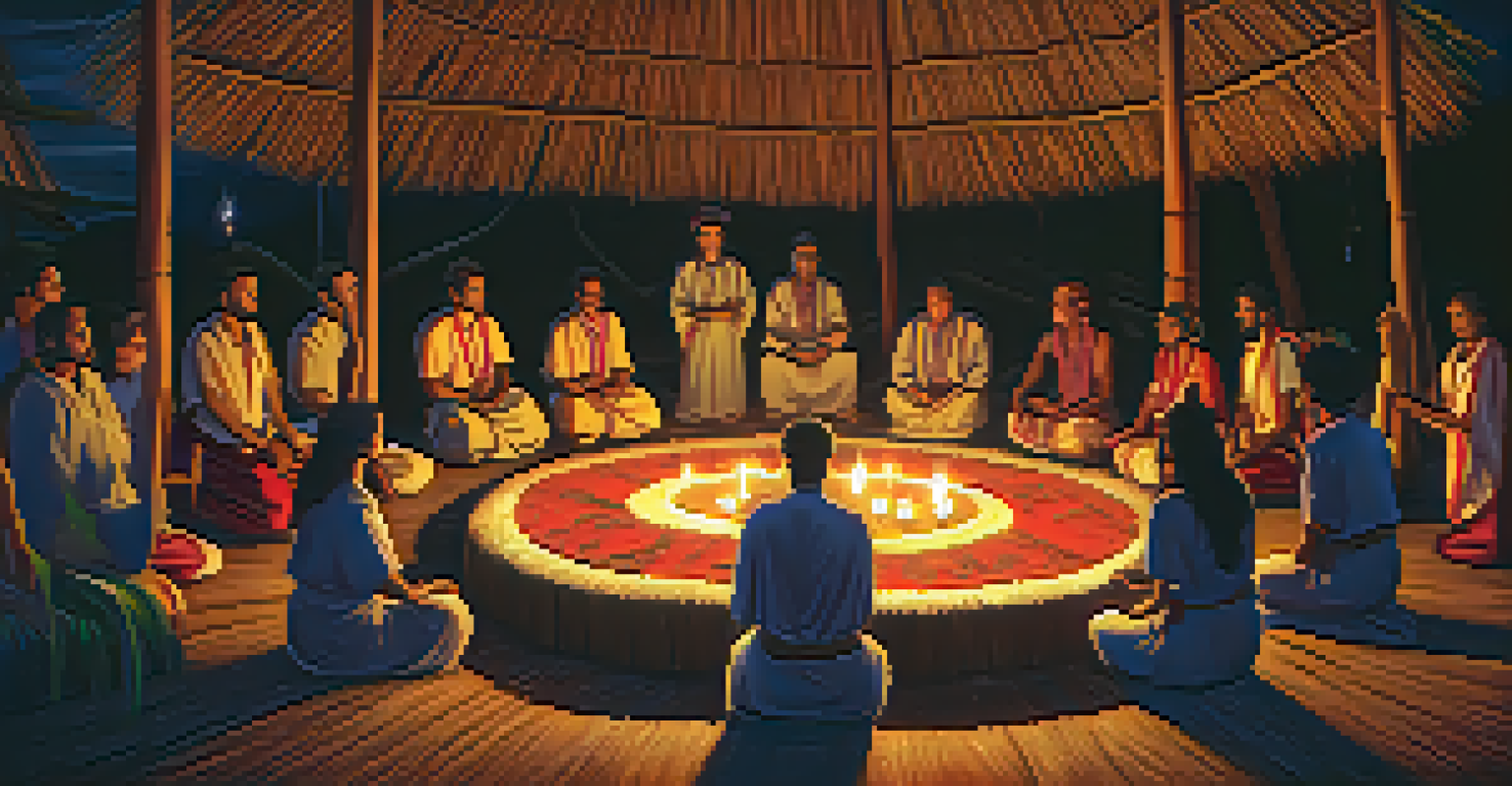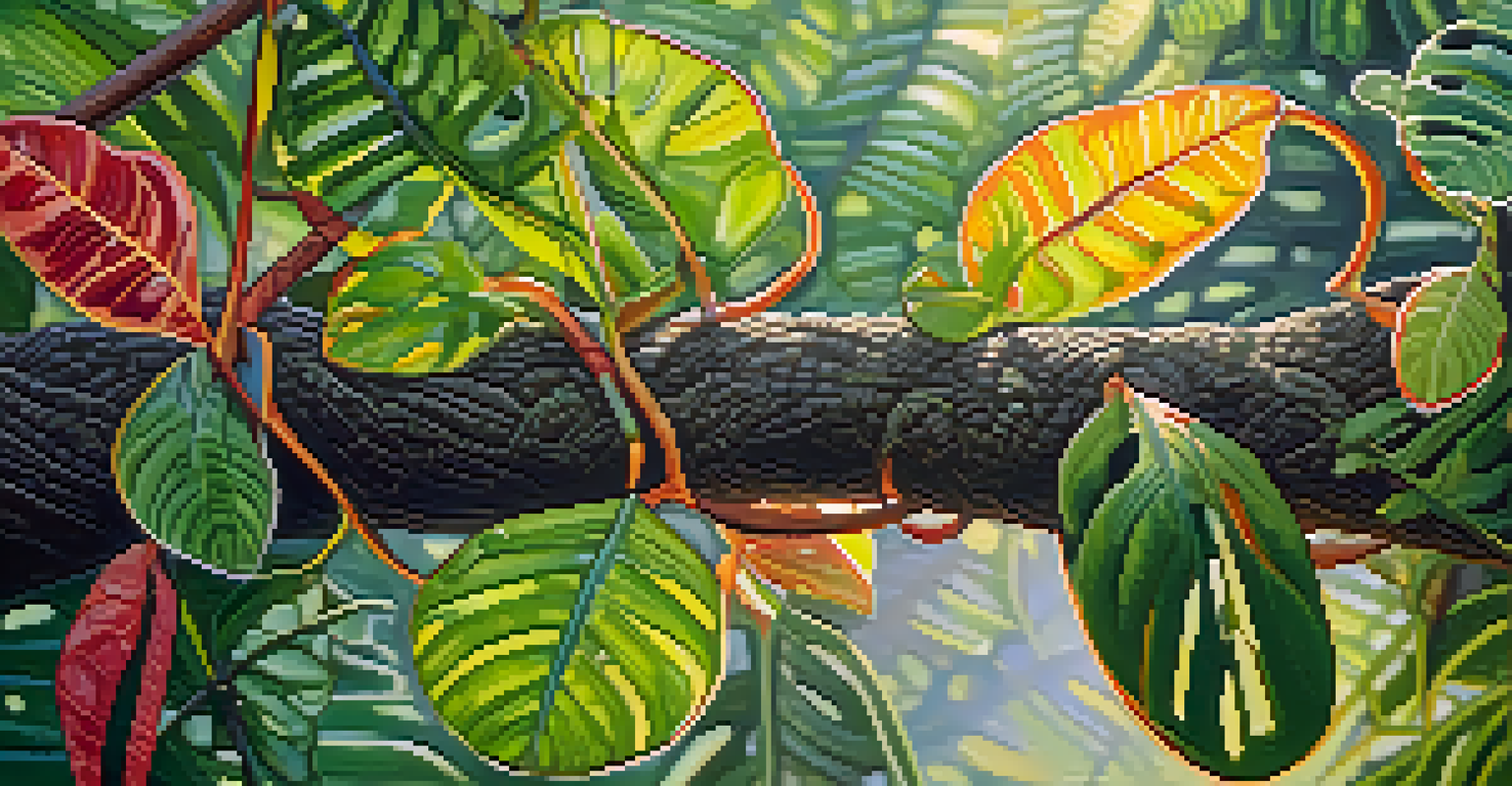Historical Uses of Ayahuasca Among Amazonian Indigenous Peoples

The Origins of Ayahuasca Use in the Amazon
Ayahuasca, a potent brew made from the Banisteriopsis caapi vine and other plants, has a rich history among Amazonian indigenous peoples. This sacred drink is believed to have been used for centuries, if not millennia, as a means to connect with the spiritual world. The origin stories surrounding ayahuasca vary, but they all underline its significance in cultural rituals and healing practices.
The plants are our teachers, and the forest is our classroom.
The indigenous tribes, such as the Shipibo and Ashaninka, regard ayahuasca as a tool for divination, allowing shamans to gain insight into the past, present, and future. These communities often view the brew as a living entity, imbued with wisdom and guidance. Such beliefs highlight the importance of nature and spirituality in their worldview, as ayahuasca becomes a bridge linking them to their ancestors and the cosmos.
Today, the legacy of ayahuasca continues to thrive, drawing the interest of researchers and spiritual seekers worldwide. Understanding its origins helps us appreciate the profound connection between the indigenous peoples and the natural world, as well as the respect they hold for this sacred plant.
Ayahuasca in Spiritual and Healing Practices
For many indigenous tribes, ayahuasca is a central component in spiritual and healing ceremonies. Shamans, or healers, use the brew to enter altered states of consciousness, allowing them to diagnose and treat ailments that affect individuals and their communities. This practice is not merely about physical healing; it encompasses emotional and spiritual well-being, demonstrating a holistic approach to health.

The experience of consuming ayahuasca can lead to intense visions and insights, which are often interpreted as messages from the spirit world. These revelations can guide individuals in overcoming personal struggles or enlightening them on their life paths. This transformative journey is often shared with a community, reinforcing social bonds and collective healing.
Cultural Roots of Ayahuasca
Ayahuasca has deep cultural significance for Amazonian indigenous peoples, serving as a bridge to the spiritual world and a tool for holistic healing.
Moreover, these ceremonies are deeply ritualistic, incorporating music, chanting, and traditional practices that enhance the experience. Such elements serve to create a safe and supportive environment, emphasizing the communal aspect of healing and the importance of shared experiences in indigenous cultures.
Cultural Significance of Ayahuasca Rituals
Ayahuasca rituals are not simply therapeutic; they are culturally significant events that embody the values and beliefs of Amazonian indigenous peoples. These ceremonies often mark important life transitions, such as coming-of-age, marriage, or mourning, allowing participants to seek guidance and support from the spiritual realm. Through these rituals, communities reinforce their identity and cultural heritage.
Ayahuasca is a bridge to the spirit world, offering insights into our lives and the cosmos.
Additionally, the communal aspect of ayahuasca ceremonies strengthens social cohesion. Participants share their experiences and insights, fostering a sense of belonging and understanding within the group. This collective participation helps preserve traditions and promotes intergenerational knowledge transfer, ensuring that the wisdom of ancestors continues to guide future generations.
As globalization encroaches upon indigenous ways of life, maintaining these rituals becomes even more critical. They serve as a reminder of resilience and cultural pride, showcasing the significance of ayahuasca as a symbol of identity and continuity for these communities.
Ayahuasca and Indigenous Knowledge Systems
Indigenous knowledge systems encompass a deep understanding of the natural world, and ayahuasca plays a vital role in this wisdom. The preparation and use of the brew involve extensive knowledge of botany, ecology, and pharmacology, passed down through generations. This traditional knowledge illustrates the intricate relationship between the indigenous peoples and their environment.
Shamans are often seen as custodians of this knowledge, possessing the skills to identify the right plants and prepare them effectively. Their expertise is not limited to ayahuasca alone; they also understand the healing properties of various other plants in the Amazon rainforest. This holistic knowledge is crucial for the sustainable use of resources and the preservation of biodiversity.
Impact of Global Interest
The growing Western interest in ayahuasca brings both opportunities and challenges, risking the commodification of sacred traditions while offering economic benefits to indigenous communities.
Furthermore, the spiritual insights gained from ayahuasca ceremonies often lead to a greater appreciation for nature and a commitment to environmental stewardship. As indigenous peoples advocate for their rights and territories, their knowledge of ayahuasca and the rainforest becomes a powerful tool in the fight for conservation and cultural survival.
Impact of Western Interest in Ayahuasca
In recent years, ayahuasca has garnered significant attention from the Western world, attracting tourists and researchers eager to experience its effects. This surge in interest has sparked both positive and negative consequences for indigenous communities. On one hand, it can lead to economic opportunities and a platform for cultural exchange; on the other hand, it risks commodifying sacred traditions.
As outsiders seek ayahuasca experiences, there are concerns about the dilution of its cultural significance. Some indigenous leaders worry that the commercialization of ayahuasca could undermine the authenticity of their rituals. This situation underscores the importance of approaching ayahuasca with respect, acknowledging the deep-rooted traditions and values that inform its use.
Moreover, the influx of visitors can also strain local resources and disrupt traditional practices. It is crucial for both visitors and communities to engage in meaningful dialogue, ensuring that the benefits of ayahuasca tourism are shared equitably and do not exploit the very cultures that have preserved this sacred knowledge for generations.
Ethics and Responsible Ayahuasca Use
As interest in ayahuasca continues to grow, discussions around ethics and responsible use become increasingly important. It is essential for individuals seeking ayahuasca experiences to educate themselves about its cultural significance and the context in which it is traditionally used. Understanding the historical and spiritual roots of the brew can foster greater respect for the indigenous peoples who have safeguarded this knowledge.
Engaging with reputable shamans and participating in ceremonies that honor traditional practices are crucial steps in ensuring a responsible approach. This includes recognizing the importance of community involvement and the need for informed consent from those who share their wisdom. Respecting the cultural protocols surrounding ayahuasca can help bridge the gap between indigenous practices and modern seekers.
Ethics in Ayahuasca Use
Responsible engagement with ayahuasca requires understanding its cultural context and prioritizing ethical practices to honor indigenous knowledge and traditions.
Additionally, it is vital to acknowledge the potential risks associated with ayahuasca consumption. While many individuals report profound insights and healing, it is crucial to approach the experience with caution, especially for those with pre-existing mental health conditions. Prioritizing safety and well-being should always be at the forefront of any ayahuasca journey.
The Future of Ayahuasca Among Indigenous Peoples
Looking ahead, the future of ayahuasca among indigenous peoples is intertwined with broader social, political, and environmental issues. As these communities strive to maintain their cultural practices, they also face challenges such as land rights, climate change, and modernization. The preservation of ayahuasca traditions is not just about the brew itself; it's about safeguarding a way of life.
Indigenous leaders are increasingly advocating for their rights and the recognition of their knowledge systems in discussions about conservation and sustainability. By asserting their sovereignty, they aim to protect the sacred plants and practices integral to their identity. This movement is essential for ensuring that future generations can continue to engage with ayahuasca in meaningful and culturally relevant ways.

Moreover, as the global interest in ayahuasca continues to rise, there is an opportunity for cross-cultural dialogue and collaboration. By fostering mutual respect and understanding between indigenous peoples and outsiders, we can create a more equitable future that honors the wisdom of those who have long revered ayahuasca as a sacred gift from the Amazon.